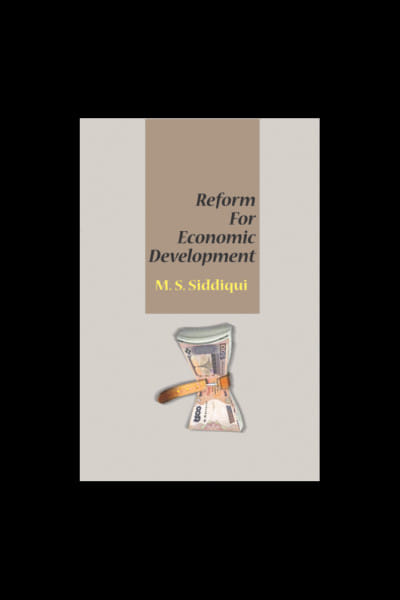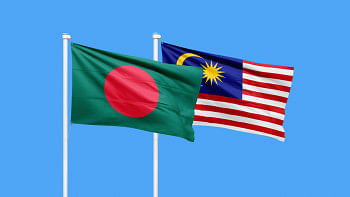Reform for Economic Development

This book is a build-up on the theories and experiences of a patriot, teacher and business thinker. Constructed in the fashion and architecture of a durable edifice, the chapters are so well-apportioned thematically that the load bearing pillars, beams and spars have been quite balanced and grooved deep into the earth of reality.
Presented into forty four major topics, the arguments as a reader might suspect from the title of the book, are not all economic but suitably weighted on other realities of a habitation.
The strings running through the book linking all the stakeholders have been twined by the writer with such practical insight, elasticity, tenor and temper that the book has been able to dispel any chances of extremism anywhere. As a consequence the status quo, the analysis, interplay and interfacing of potential factors have taken a capitalistic though, well-fare oriented evolution. So the brick-laying and mortar work of this edifice have been scientific but not linear. Thus first things have appeared first and then the next ones have followed suit. The author, in spite of being a patriot has credited the West with the genesis and development of society, law, ethics, morality, government, governance, inventions and innovations under which any society can benefit and thrive. The book is thus replete with western thinkers, bankers and their creations. CRPC (1898), Evidence Act 1872, Bretton Woods, IMF, ADB, WB, JP Morgan, Goldman, Merrill Lynch etc. After tabling a process, system, law or instrument, he has also shown how these have had kick-offs in the comity of nations and then calculated the standard deviation Bangladesh is standing at. He has actually shown all the items of this expansive book as juxtaposition with the major countries of the world. That has been a great pointer which will be advantageous for the users of this book to appreciate and measure how practical the writer's analysis is. He opines the impact of international law in the legal system depends on the source of the international law in question. Many would agreewith the writer on this point. There are many further points and topics where readers would find affinity. His tracing of the past, i.e. genesis, evolution, assessment and rationale for furthering the current definitions to betterment are logical and understandable. In spite of linking the topics to their international origins the writer has shown commendable realism in being practical about the country specific situation of Bangladesh. In essence, accordingly no reforms would be considerable here which are poised beyond and above the culture and sociological realities of the populace. However there are probably one or two disclaimers. It is about the chapter on Bangladesh's competitiveness. Due to the same cultural lineage i.e. mongering profits beyond quality and contributions, our competitiveness in business has not been able to show growth and on a net basis it is not growing. This concept/perception can be validated with the export earnings through a big reporting period. e.g. 1995-2015. It shows her import bills have steadily been much higher than her export earnings. This has been taking place in spite of all the success story of the garments and other sectors in the banner of private entrepreneurs. The import bills which are thrice as much as the export earnings are being paid by wage earners' remittance. Within the domestic market, the meaning of competitiveness does not carry much weight as the same cake is being eaten by one or the other company or cluster of companies. The author inter alia reinforces this perception in "Barriers to building industries" episode at pages 105-109. He quotes, " Bangladesh is falling behind China, India etc."; here he has attributed this to ineptness of bureaucracy, corruption, scarcity of utilities etc. But he has not touched on the amount of profit that private entrepreneurs are earning compared to India, in spite of their barriers and more importantly how much of that profit is being provided by state owned banks by allowing wavering of interest and loans profoundly. In China it is partly the same i.e. state loans and partly accepting marginal profits. On the other hand in India it is just marginal profits. On the whole there are ample grounds in the history of Bangladesh's economic development, for the writer to have admitted in this book that its appearance and reality are both mainly contribution of the government. Being comparatively low paid, the bureaucrats will somehow share a part of the booty by causing impediments in the path of doing business is a reality. It is equally unethical as the businessmen's inordinate appetite for profit is. So the cheerful story of the private sector is being told by ones while the creator of the story is mainly someone different (the government). I also tend to say something on the writers' stand on 'ADR' chapter. Agreeing with his analysis, two additional major factors could be considered here. One, the population size (175 million actually) must be reduced as it is the main driving factor for the concomitant litigation. Two, our culture is mainly one of self-defense and little of prosecution and indictment. Self-defense is very profitable and that is why all eminent lawyers belong to this side. Prosecution is a totally different skill and not at all profitable. Even the judges are adept in self-defense instead of prosecution and indictment. It is evident in their innumerable expressions on feeling embarrassment in many cases where punishment would be the only verdict. Witnesses and judges are equally scared. When the national consensus is "I agree with the verdict but the palm tree is mine" the ADR is not going to be fruitful.
This appropriately sized book is a significant contribution to not only recording the history of these important public issues but also in analyzing and proposing practical improvement and way out with the common strategic objective of the nation's economic welfare. The casing of the book is sedate.
The diction and vocabulary are well chosen and easy to understand. The only weak part of the book is its typos. Interestingly, correcting that is the easiest job to do.Business leaders, academics, legislators and bureaucrats will find this book quite useful.
The reviewer is Fiction Writer, Critic and Comptroller and Auditor General of Bangladesh
Palok Publishers, Pages – 264 Price: TK 450.00

 For all latest news, follow The Daily Star's Google News channel.
For all latest news, follow The Daily Star's Google News channel. 



Comments